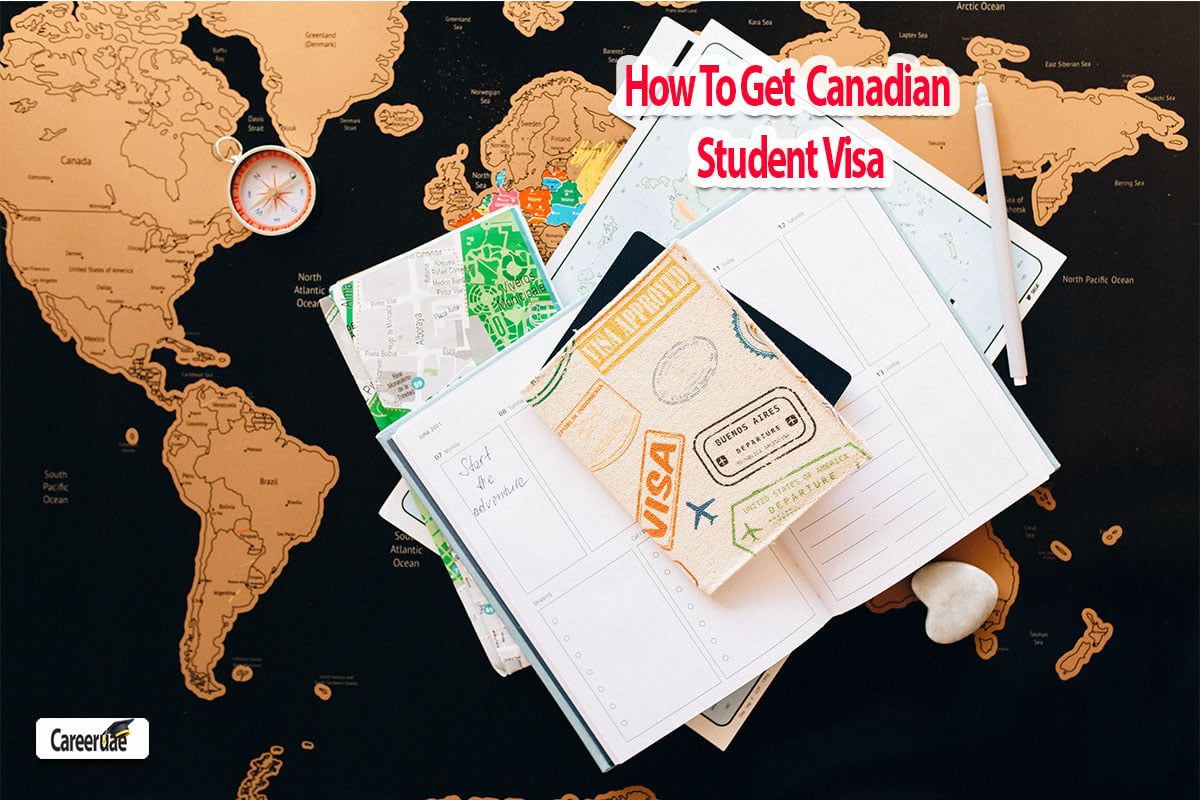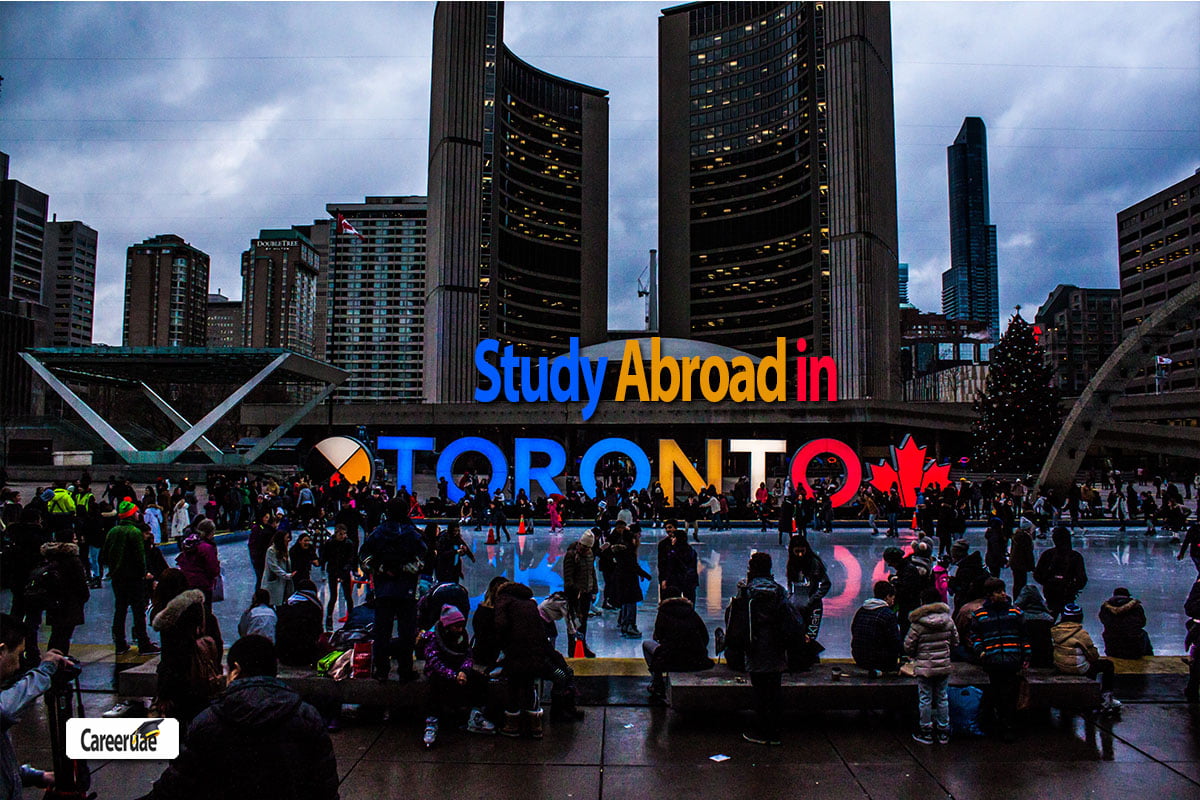To get a Canadian student visa, you need to apply to a designated learning institution (dli) and provide evidence of acceptance and financial support for your studies. Additionally, you must submit a completed visa application, pay the required fees, and undergo a medical examination.
Studying in Canada is a dream for many international students as the country offers excellent educational opportunities and a multicultural environment. To make this dream a reality, it is crucial to understand the process of obtaining a Canadian student visa.
This article will guide you through the essential steps and requirements to successfully secure your student visa. By following these guidelines, you can increase your chances of receiving your Canadian student visa and embark on a transformative educational journey in Canada. So, let’s dive in and learn how to make your dream of studying in Canada come true.
Understanding The Canadian Student Visa Process
To successfully obtain a Canadian student visa, it is crucial to understand the intricate process involved. This informative article provides valuable insights and step-by-step guidance on how to navigate the application procedure smoothly and increase your chances of approval.
Studying in Canada offers a wealth of opportunities for international students. Before embarking on this exciting educational journey, it’s important to understand the Canadian student visa process. In this section, we will explore the eligibility criteria for a Canadian student visa, the different types of Canadian student visas, the documents required for the visa application, and how to choose the right Canadian educational institution.
Eligibility Criteria For Canadian Student Visa:
To be eligible for a Canadian student visa, you need to meet certain criteria. Here are the key eligibility requirements:
- Acceptance from a designated learning institution (dli): You must have an acceptance letter from a Canadian dli before applying for a student visa.
- Proof of financial support: You need to demonstrate that you have enough funds to cover your tuition fees, living expenses, and return transportation.
- Health and character requirements: You must provide a medical exam certificate and a police certificate to prove your good health and character.
- Language proficiency: Depending on your chosen program, you may need to submit English or French language test results, such as IELTS or TOEFL.
Different Types Of Canadian Student Visas:
There are two primary types of Canadian student visas:
- Study permit: This is the most common type of student visa, issued to international students enrolled in programs that last longer than six months.
- Student direct stream (SDS): This expedited processing option is available to students from selected countries who meet specific requirements, including language proficiency and financial capacity.
Documents Required For The Visa Application:
When applying for a Canadian student visa, you will need to gather the following documents:
- Valid passport or travel document
- Letter of acceptance from a Canadian deli
- Proof of financial support (bank statements, scholarship documents, etc.)
- Completed application forms
- Language proficiency test results
- Medical exam certificate
- Police certificate (if applicable)
How To Choose The Right Canadian Educational Institution:
Selecting the right educational institution is crucial for your academic and personal growth. Consider the following factors when making your choice:
- Program suitability: Ensure that the institution offers the program you wish to pursue and that it aligns with your academic and career goals.
- Reputation and rankings: Research the institution’s reputation, rankings, and accreditation to gauge its quality and recognition.
- Available support services: Consider the availability of counseling, academic support, career guidance, and extracurricular activities.
- Location and cost of living: Determine whether the institution is located in a city that suits your lifestyle preferences and budget constraints.
- Scholarships and financial aid: Explore the scholarships and financial aid options offered by the institution to ease your financial burden.
Understanding the Canadian student visa process is essential for a smooth transition to studying in Canada. By meeting the eligibility criteria, choosing the right educational institution, and gathering the necessary documents, you can embark on your educational journey with confidence.
Step-By-Step Guide To Canadian Student Visa Application
Discover the step-by-step approach to successfully applying for a Canadian student visa. This comprehensive guide provides valuable insights and detailed instructions to help you navigate the process with ease.
Researching And Selecting A Canadian University Or College
- Research various universities and colleges in Canada to find the best fit for your academic goals and personal preferences.
- Consider factors such as reputation, program offerings, location, cost of living, and campus facilities.
- Visit the universities’ official websites and explore their academic programs, admission requirements, and student support services.
- Read reviews and testimonials from current and former students to get an idea of the university’s culture and student experience.
Understanding The Application Process For Canadian Student Visa
- Familiarize yourself with the process of applying for a Canadian student visa, also known as a study permit.
- Visit the official website of the Government of Canada to gather accurate and up-to-date information on the application process.
- Review the eligibility criteria to ensure you meet the requirements for obtaining a student visa.
- Understand the importance of providing genuine and accurate information in your application to avoid complications or rejections.
- Take note of any additional documents or procedures specific to your country of residence.
Gathering And Preparing The Required Documents
- Gather all the necessary documents required for your Canadian student visa application.
- Commonly required documents include:
- Valid passport
- Letter of acceptance from a Canadian university or college
- Proof of financial support to cover tuition fees and living expenses
- Academic transcripts and diplomas
- Language proficiency test results (e.g., ielts, toefl)
- Police clearance certificate
- Make sure to carefully read and follow the document specifications outlined by the Canadian government.
- Organize your documents in a systematic manner and make copies for your personal records.
Submitting The Visa Application
- Complete and submit your Canadian student visa application online or through a visa application center.
- Pay attention to the accuracy and completeness of the information provided.
- Double-check that all required documents have been attached before submitting.
- Review your application for any errors or inconsistencies to ensure a smooth processing of your visa.
- Note the processing times for student visa applications and plan your application submission accordingly.
Paying The Application Fees
- Pay the required application fees for your Canadian student visa.
- The fees can be paid online using a credit card or through other designated payment methods.
- Keep a record of your payment confirmation for future reference.
- Be aware of the fee refund policy in case your application is rejected or withdrawn.
- Visit the official Canadian government website for the most accurate and up-to-date information on the fees.
Tracking The Status Of Your Application
- After submitting your Canadian student visa application, you can track its status through the official portal or application center.
- Use the unique tracking number provided to check the progress of your application.
- Regularly monitor updates and notifications regarding your application status.
- Be patient, as visa processing times may vary, and avoid contacting the government authorities for updates unless necessary.
- Once your application is approved, you will receive your student visa and further instructions on traveling to Canada.
Remember, researching and selecting a suitable Canadian university, understanding the application process, gathering the necessary documents, submitting the visa application, paying the fees, and tracking the application status are vital steps to acquiring your Canadian student visa. Adhere to the guidelines provided by the Canadian government, and ensure that your application is accurate and complete to increase your chances of obtaining a study permit.
Good luck on your journey towards studying in Canada!
Navigating The Student Visa Interview
Learn the key tips for a successful Canadian student visa interview. Discover how to navigate the process and increase your chances of obtaining a student visa.
Preparing for the student visa interview:
- Research the interview process and familiarize yourself with the requirements and documents needed.
- Dress professionally and be punctual for the interview.
- Practice answering potential questions with a friend or family member.
- Organize your documents in a neat and accessible manner.
Common interview questions and how to answer them:
- “Why do you want to study in Canada?”
- Explain your reasons for choosing Canada, such as the quality of education, diverse culture, and opportunities for personal and academic growth.
- “what are your plans after completing your studies?”
- Outline your career goals and how studying in Canada aligns with those goals.
- “how do you plan to finance your education and living expenses?”
- Provide details about your financial plan, whether it involves personal savings, scholarships, or support from family.
- “what are your ties to your home country?”
- Emphasize your connections to your home country, such as family, future employment prospects, or community involvement.
Tips for a successful visa interview:
- Be confident and maintain good eye contact with the interviewer.
- Speak clearly and concisely, addressing the question directly.
- Demonstrate genuine interest in your chosen course of study and the institution you’ll be attending.
- Show evidence of strong ties to your home country to assure the interviewer that you’ll return after completing your studies.
Overcoming language barriers during the interview:
- Improve your fluency and pronunciation by practicing English daily.
- Familiarize yourself with common interview vocabulary and expressions.
- Don’t hesitate to ask the interviewer to repeat or clarify a question if needed.
- Use simple and clear language to convey your thoughts effectively.
Remember, the student visa interview is an opportunity to showcase your enthusiasm, preparedness, and genuine intention to study in Canada. By adequately preparing for the interview, understanding common questions, and adopting effective communication strategies, you can increase your chances of obtaining a Canadian student visa.
Good luck!
Financing Your Canadian Education
Discover the steps to obtaining a Canadian student visa to finance your education. Learn about the requirements and process to make your dream of studying in Canada a reality.
Understanding The Cost Of Studying In Canada
Studying in Canada is a dream for many international students, but it’s important to understand the financial aspects before embarking on this journey. Here are some key points to consider:
- Tuition fees: Canadian universities and colleges offer a wide range of programs, and tuition fees can vary depending on the institution and course. On average, undergraduate programs can range from cad $15,000 to cad $30,000 per year, while graduate programs may be slightly higher.
- Living expenses: In addition to tuition fees, you’ll need to budget for living expenses such as accommodation, food, transportation, and personal expenses. The cost of living can vary depending on the city or province, but a rough estimate ranges from cad $10,000 to cad $15,000 per year.
- Health insurance: All international students are required to have health insurance while studying in Canada. The cost of health insurance can vary depending on the province and the coverage provided, and it is typically around cad $600 to cad $800 per year.
- Additional costs: Apart from tuition, living expenses, and health insurance, you may also need to consider other expenses such as textbooks, study materials, and visa application fees.
Scholarships And Financial Aid Opportunities For International Students
Studying in Canada can be expensive, but there are several scholarships and financial aid opportunities available for international students. Consider the following options:
- Government scholarships: The Canadian government offers various scholarships for international students, such as the Vanier Canada graduate scholarships and the Global Affairs Canada scholarships.
- Institution-specific scholarships: Many Canadian universities and colleges offer scholarships and bursaries specifically for international students. Check with the institution you’re interested in to learn about their scholarship programs.
- External scholarships: Several organizations, both in Canada and internationally, offer scholarships for international students studying in Canada. Research and apply for these scholarships through online platforms like scholarshipCanada.com or international scholarship directories.
- Work-study programs: Some institutions offer work-study programs that provide part-time job opportunities on campus. These programs allow students to earn money while gaining valuable work experience.
Part-Time Job Options For International Students
Working part-time while studying in Canada can help you cover some expenses and gain work experience. Here are some part-time job options for international students:
- On-campus jobs: Many Canadian institutions have job boards where students can find on-campus employment opportunities. Some common on-campus jobs include working at the library, cafeteria, or administrative offices.
- Off-campus jobs: International students can also work off-campus for up to 20 hours per week during regular academic sessions and full-time during scheduled breaks. Job opportunities may be available in sectors such as retail, hospitality, and customer service.
- Co-op programs: Some programs offer co-op or internship opportunities where students can work in their field of study while earning academic credits and a salary.
Managing Your Finances While Studying In Canada
Managing finances is crucial to ensure a smooth academic journey in Canada. Here are some tips to help you manage your money effectively:
- Create a budget: Make a detailed budget that includes your income, expenses, and savings goals. Stick to your budget to avoid overspending and to save money for emergencies or future plans.
- Track your expenses: Keep a record of your spending to identify areas where you can cut back. Use budgeting apps or spreadsheets to help you track your expenses easily.
- Take advantage of student discounts: Many places in Canada offer discounts to students, including public transportation, entertainment venues, and retail stores. Always carry your student id to avail of these discounts.
- Explore free activities: Look for free activities and events in your city or on campus. From museums to outdoor festivals, there are often plenty of free or low-cost options for entertainment.
- Seek financial advice: If you face financial challenges or need guidance, don’t hesitate to reach out to your institution’s financial aid office or seek advice from a financial counselor.
Exploring Visa Extensions For Post-Graduation Work Permits
As an international student in Canada, you may have the opportunity to extend your stay after graduation through a post-graduation work permit (pgwp). Here’s what you need to know:
- Eligibility: To be eligible for a PGWP, you must have completed a program of study at a designated learning institution in Canada. The duration of the work permit depends on the length of your program, with a maximum of three years.
- Job opportunities: A pgwp allows you to work for any employer in Canada and gain valuable work experience in your field of study. This experience can be a stepping stone towards permanent residency in Canada.
- Applying for permanent residency: A pgwp can help you in your application for permanent residency in Canada through programs such as the Canadian experience class or the provincial nominee program. Check the eligibility criteria and requirements for these programs to plan your future in Canada.
Remember, understanding the cost of studying, exploring financial aid opportunities, managing your finances, and considering post-graduation work permit extensions are essential aspects of planning your Canadian educational journey.
Settling Into Canadian Student Life
Settling into Canadian student life becomes easier with a step-by-step guide on obtaining a Canadian student visa. Navigate the process smoothly and prepare for an enriching academic journey in Canada.
Moving to a new country can be an exciting adventure, but it also comes with its challenges. When it comes to studying in Canada, it’s important to not only focus on your academics but also take the time to settle into Canadian student life.
Here are some key aspects to consider:
Finding Accommodation In Canada:
Finding a place to live is one of the first and most important tasks you’ll face as an international student in Canada. Here are some options to consider:
- On-campus housing: Many Canadian universities and colleges offer on-campus housing options for students. This can be a convenient and immersive way to experience student life.
- Off-campus rentals: Renting an apartment or house off-campus can provide more independence and flexibility. Websites and online platforms can help you find available rentals in your desired area.
- Homestays: Living with a Canadian family can provide a unique cultural experience and a supportive environment, especially for students who are new to the country.
Getting Health Insurance As An International Student:
Health insurance is crucial for international students in Canada. Here’s what you need to know:
- Provincial health coverage: Most provinces in Canada offer health coverage for international students. Make sure to apply for the necessary health card and understand the coverage and services available to you.
- Private health insurance: In some cases, you may need additional private health insurance to supplement your provincial coverage. Research different insurance providers to find the best fit for your needs.
- Student health services: Most Canadian institutions have dedicated health services on campus. Take advantage of these resources for routine check-ups, vaccinations, and any medical concerns.
Socializing And Making Friends In Canada:
Building a social network is an essential part of the international student experience. Consider these tips:
- Join student clubs and organizations: Universities and colleges in Canada offer a wide range of clubs and organizations catering to different interests. Find groups that align with your hobbies or cultural background to meet like-minded people.
- Participate in campus events: Attend orientation sessions, workshops, and events organized by your institution. These can be great opportunities to meet fellow students and make connections.
- Explore your community: Don’t limit your social interactions to campus. Take the time to explore the local community and engage in activities such as volunteering, attending festivals, or joining community sports teams.
Understanding Canadian Culture And Customs:
Adapting to a new culture can be an enriching experience. Here’s how to navigate Canadian culture and customs:
- Learn about Canadian values: Canada is known for its multiculturalism, politeness, and respect for diversity. Educate yourself about these values to better understand the Canadian way of life.
- Engage in cultural exchange: Connect with Canadian students and locals to learn more about their traditions and customs. This can help foster cross-cultural understanding and make your experience in Canada more meaningful.
- Keep an open mind: Be receptive to new ideas and perspectives. Embrace the opportunity to learn from people who have different backgrounds and experiences.
Accessing Support Services For International Students:
It’s important to know that you’re not alone during your Canadian student journey. Take advantage of the support services available:
- International student advisors: Most institutions have dedicated advisors who can assist with visa-related matters, academic support, and integration into Canadian life. Seek their guidance whenever needed.
- Peer mentoring programs: Some schools offer peer mentoring programs where more experienced students help newcomers adjust to their new environment. These mentors can provide valuable insights and support.
- Language support: If english or french is not your first language, utilize language support services to enhance your language skills. Improving your language proficiency can boost your academic performance and social interactions.
Remember, settling into Canadian student life entails more than just being a student. Embrace the opportunities, explore the culture, and make the most out of your time in Canada.
Exploring Opportunities Beyond Academics
Discovering new opportunities and expanding your horizons goes beyond academics. Learn how to navigate the process of obtaining a Canadian student visa for an enriching international educational experience.
Studying in Canada offers international students a chance to not only acquire a world-class education but also explore various opportunities beyond academics. Engaging in extracurricular activities can enhance your overall experience and help you make the most out of your time in Canada.
Here are some avenues to explore:
Part-Time Job Options And Internships For International Students:
- Working part-time while studying can provide financial stability and valuable professional experience. Many Canadian universities offer on-campus jobs specifically for international students.
- Off-campus work permits allow international students to work off-campus for up to 20 hours per week during academic sessions and full-time during breaks.
- Internship opportunities can provide hands-on experience in your field of study and help you build a network of professional contacts.
Joining Student Clubs And Organizations:
- Participating in student clubs and organizations allows you to connect with like-minded individuals who share your interests and passions.
- It provides you with opportunities for personal growth, leadership development, and the chance to make lifelong friendships.
- Through clubs and organizations, you can engage in various activities such as community service, sports, cultural events, and academic competitions.
Engaging With The Local Community:
- Getting involved in the local community is a great way to experience Canadian culture and develop a deeper understanding of the country.
- Volunteering for local organizations or participating in community events can help you establish connections and make a positive impact.
- Engaging with the local community also provides opportunities to improve your language skills and learn about Canadian customs and traditions.
Traveling And Exploring Canada During Breaks:
- Canada’s diverse landscape offers incredible opportunities for travel and exploration during semester breaks.
- From stunning national parks and vibrant cities to picturesque coastal towns, there is something for everyone.
- Traveling allows you to experience different provinces, immerse yourself in Canadian heritage, and create unforgettable memories.
Networking Opportunities For International Students:
- Building a strong professional network is essential for future career prospects. Attend career fairs, networking events, and guest lectures to connect with industry professionals.
- Participate in university workshops and seminars that focus on career development and job search strategies.
- Engaging with professionals in your field can open doors to internships, job referrals, and potential employment after graduation.
Remember, being actively involved in extracurricular activities and exploring opportunities beyond academics not only enriches your student life but also contributes to your personal and professional growth. So don’t hesitate to step out of your comfort zone and make the most of your Canadian journey!
Frequently Asked Questions On How To Get A Canadian Student Visa
What Are The Eligibility Requirements For a Canadian Student Visa?
To be eligible for a Canadian student visa, you must have been accepted by a Canadian educational institution, provide proof of funds to support yourself, have a clean criminal record, and satisfy health requirements. Additionally, you may also need to pass an English or French language test.
How Long Does It Take To Get A Canadian Student Visa?
The processing time for a Canadian student visa varies, but it usually takes around 4 to 8 weeks. It is recommended to apply well in advance to allow for any delays or additional documentation that may be required.
Can I Work While Studying On A Canadian Student Visa?
Yes, as an international student with a valid study permit, you can work part-time (up to 20 hours per week) during academic sessions and full-time during scheduled breaks. This allows you to gain valuable work experience and supplement your income to meet your financial needs.
Conclusion
Obtaining a Canadian student visa may seem like a daunting process, but with the right guidance and understanding of the requirements, it can be achievable. Remember to research the specific guidelines and documents needed for your country of residence and chosen institution.
Plan ahead to ensure ample time for gathering all necessary paperwork, completing language proficiency tests, and submitting your application. Be prepared to showcase your academic achievements, financial stability, and genuine intent to study in Canada. Utilize online resources, such as the official government websites and forums, for accurate and up-to-date information.
Additionally, consulting experienced immigration advisors can provide valuable assistance throughout the application process. Remember, persistence and determination are key. By taking the necessary steps and following the guidelines, you are one step closer to your dream of studying in Canada.
Good luck!





